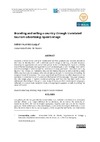Identificador persistente para citar o vincular este elemento:
https://accedacris.ulpgc.es/jspui/handle/10553/70352
| Campo DC | Valor | idioma |
|---|---|---|
| dc.contributor.author | Fuentes Luque, Adrián | en_US |
| dc.date.accessioned | 2020-02-19T08:28:30Z | - |
| dc.date.available | 2020-02-19T08:28:30Z | - |
| dc.date.issued | 2016 | en_US |
| dc.identifier.issn | 1133-1127 | en_US |
| dc.identifier.uri | https://accedacris.ulpgc.es/handle/10553/70352 | - |
| dc.description.abstract | Countries and territories willing to market and sell their products and services abroad do their best to identify them with a defined, specific image or identity, a brand. However, choosing the appropriate one sometimes proves to be a confusing task. Spain is probably one of the best examples, facing problems such as stereotypes, a poor strategic vision and a lack of knowledge of what is expected, and how it is really perceived. Translators are a key figure in this process. As mediators, they are not merely linguistic experts (Fuentes & Kelly, 2000), but intercultural analysts, who should take active part in the process of building the image or brand of a country. The branding and selling of the country often depends on the translator to enhance the communicative effectiveness of the message. This paper analyses the role image plays in Spain’s tourist advertising, and how this has been and is now addressed, illustrating it through a case study of examples from institutional campaigns, reflected on a small-scale reception study among English-speakers aimed at probing the views of tourists. | en_US |
| dc.description.abstract | Los países y territorios que intentan comercializar sus productos y servicios en el extranjero intentan ofrecer una imagen definida de si identidad, de su marca. No obstante, en ocasiones es difícil dar con la imagen apropiada. España quizá sea uno de los mejores ejemplos: debe enfrentarse a los estereotipos, a una visión estratégica deficiente y a una falta de conocimiento de lo que se espera y cómo se percibe realmente. Los traductores son clave en este proceso. Como mediadores, son mucho más que expertos lingüísticos (Fuentes & Kelly, 2000); son analistas interculturales, que deben participar activamente en el proceso de construcción de la imagen de una marca o un país, proceso que a menudo depende del traductor para potenciar la eficacia comunicativa del mensaje. Este artículo analiza el papel de la imagen en la publicidad o promoción turística de España, y cómo se ha abordado, ilustrándolo mediante un estudio de caso con ejemplos de campañas institucionales basadas en un estudio de recepción entre turistas de habla inglesa a fin de sondear sus opiniones. | en_US |
| dc.language | eng | en_US |
| dc.relation.ispartof | LFE. Revista de Lenguas para Fines Específicos | en_US |
| dc.source | LFE. Revista de lenguas para fines específicos [eISSN 2340-8561], v. 22 (2), p. 84-103 | en_US |
| dc.subject | 570107 Lengua y literatura | en_US |
| dc.subject | 550510 Filología | en_US |
| dc.subject.other | Advertising | en_US |
| dc.subject.other | Branding | en_US |
| dc.subject.other | Image | en_US |
| dc.subject.other | Reception | en_US |
| dc.subject.other | Tourism | en_US |
| dc.subject.other | Translation | en_US |
| dc.subject.other | Publicidad | en_US |
| dc.subject.other | Marca | en_US |
| dc.subject.other | Imagen | en_US |
| dc.subject.other | Recepción | en_US |
| dc.subject.other | Turismo | en_US |
| dc.subject.other | Traducción | en_US |
| dc.title | Branding and selling a country through translated tourism advertising: Spain’s image | en_US |
| dc.type | info:eu-repo/semantics/article | en_US |
| dc.type | Article | en_US |
| dc.identifier.doi | 10.20420/rlfe.2016.113 | en_US |
| dc.investigacion | Artes y Humanidades | en_US |
| dc.type2 | Artículo | en_US |
| dc.identifier.ulpgc | Sí | es |
| dc.description.esci | ESCI | |
| dc.description.dialnetimpact | 0,0 | |
| dc.description.dialnetq | Q1 | |
| dc.description.dialnetd | D3 | |
| dc.description.erihplus | ERIH PLUS | |
| item.fulltext | Con texto completo | - |
| item.grantfulltext | open | - |
| Colección: | Artículos | |
Citas de WEB OF SCIENCETM
Citations
5
actualizado el 25-ene-2026
Visitas
34
actualizado el 11-ene-2026
Descargas
46
actualizado el 11-ene-2026
Google ScholarTM
Verifica
Altmetric
Comparte
Exporta metadatos
Los elementos en ULPGC accedaCRIS están protegidos por derechos de autor con todos los derechos reservados, a menos que se indique lo contrario.
